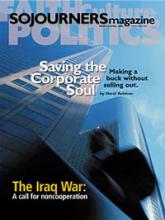And what of beauty? Six years ago, as a 37-year-old American evangelical Christian, it dawned on me that I had spent a great part of my life searching for truth at the expense of beauty. Or maybe it is better to say that I had obsessed myself with the pursuit of "true" truthsbooks, theology, languages, doctrine, and graduate degrees. I was searching for the God I could understand with my mind, grasp within my reason, grip with the gray matter of my consciousness. Eventually I discovered that all these things were mere mind gamesevery one of them. Not that any of my mind searches were bad, but something was haunting and calling my heart. There was something missing, something more tugging at me.
I had bought into one of the most deadening myths of American evangelical Christianitythat God resides squarely within the Word, but not the world and the earthy, sensual things of this world. I was taught by the mainstream that God was a rational God, but beware of the sensual, dancing, untamed Creator of beauty. I was taught that God was the Creator, but beware of the creators of sensual, dancing, untamed beauty.
I felt this tension fiercely in my mind. While reading and studying books about God in the seminary and the church, I would secretly steal away to the arms of beauty. William Faulkner's Light in August. Ernest Hemingway's A Farewell to Arms. Pablo Picasso's The Yellow Sweater. Toni Morrison's The Bluest Eye. Arvo Pärt's Passio. Gabriel García Márquez's Love in the Time of Cholera. Robert Plant's "Ship of Fools." Gerard Manley Hopkins' "As Kingfishers Catch Fire." They seduced me. They spoke to mespoke something to me that the Word alone could never tell. They consoled me. Where does it say that God would be limited to the Word and the Word alone? And what of the world? Has God, the Western-conceived rational God, absconded into the Word only to abandon this beautiful world?
Read the Full Article
